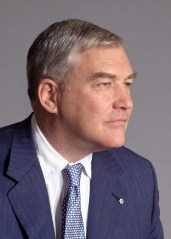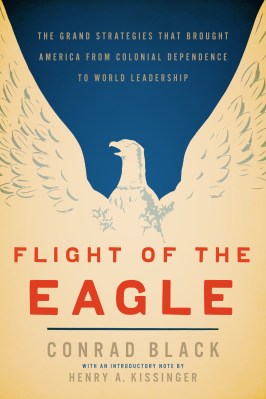The Signing the Declaration of Independence, by John Trumbull.
Canadian newspaperman, financier and author Conrad Black wrote most of his new book, Flight of the Eagle: The Grand Strategies that Brought America from Colonial Dependence to World Leadership, inside a Florida prison cell, where he spent three years for fraud and obstruction of justice.
That can provide just the sort of detachment a historian – Lord Black has written acclaimed biographies of Franklin D. Roosevelt and Richard Nixon – needs to set his writing apart. In Flight of the Eagle, Black offers the nine phases that he says the U.S. endured en route to becoming the globe’s lone superpower, as well as the key decisions made by U.S. leaders to put it there. Battleland conducted this email chat with Black earlier this week.
What’s the key takeaway of Flight of the Eagle: The Grand Strategies that Brought America from Colonial Dependence to World Leadership
The United States did not become a Great Power just because it was able to attract highly motivated immigrants to a rich continent and its founders set up workable institutions.
Those facts were important, of course, but also, the country became immensely powerful because statesmen took imaginative, courageous, and innovative steps at various stages of its rise to move it up to the next phase.
The statesmen are almost all famous, but not necessarily for the measures they took that are recounted here.
Why did you write it?
Because, as Henry Kissinger wrote in his introductory note, this approach had not really been taken before.
There is a vast literature on American history, much of it very scholarly and well-written, but I was and am, not aware that the history of the country has been recounted from the perspective of the strategic decisions that made it a great nation.
Summarize the nine phases you see that played a role in the strategic growth of the United States.
1. Collaborating with the British in the eviction of the French from America. (Franklin, Washington)
2. Inducing the French to help evict the British from America. (Franklin, Washington)
3. Setting up workable republican institutions with a leader who set the example of avoiding recourse to military intervention in government and voluntary withdrawal from the highest office, and recognizing the potential for economic growth. (Washington, Madison, Hamilton, Jay)
4. Balancing the continued existence of slavery with refusal to tolerate secession until the North grew strong enough to be able to suppress the insurrection when it came. (Jackson, Polk)
5. Waging the Civil War to suppress the insurrection and tucking emancipation of the slaves into it as an ostensible furtherance of the chief war aim, as well as for moral reasons. (Lincoln)
6. Allowing America to be America and grow rapidly and freely in population and economic productivity with a strong currency and no foreign distractions. (Grant, Cleveland, McKinley et al.)
7. Taking its place among the Great Powers with both the sinews of national strength and an uplifting moral purpose. (Theodore Roosevelt and Wilson)
8. Restoring prosperity and an equitable distribution of it, setting aside isolationism, helping vitally to keep Britain and Canada and Russia in the war, engineering an entry into WWII with a united national opinion, conducting the war brilliantly so that the West retrieved Germany, France, Italy, and Japan, but Russia took 95% of the casualties fighting the Germans, and recognizing the strategic necessity of American involvement with Western Europe and East Asia. (Franklin D. Roosevelt)
9. The containment strategy of deterring international Communism and inducing its gradual decay and collapse without a general war. (Truman, Marshall, Acheson, MacArthur, Eisenhower, Kennan, Nixon, Kissinger, Reagan)
As the world becomes more interconnected, is the notion of a “superpower” becoming obsolete?
No, if the U.S. wants to be active throughout the world. Some other countries are regional powers that could become influential in the whole world, especially China and Germany.
Among the various components of national power – including economic, military, diplomatic – which do you see as increasing in importance in the future, and/or shrinking?
Other than in the most extraordinary circumstances, diplomatic power merely reflects military and economic strength. Moral distinction can count for something but not without the real sources of material strength.
Economic power will grow and military power will remain stable — all that is usually necessary is the ability to deter aggression.
Did your non-Americaness play a role in your decision to write this book – and how you wrote it?
I don’t think so, as I know the country well and was a part-time resident.
One reader graciously wrote me that it may have helped me to “remove mythology while honoring the accomplishments.” Perhaps that is true.
Do you wish you were an American?
No.




